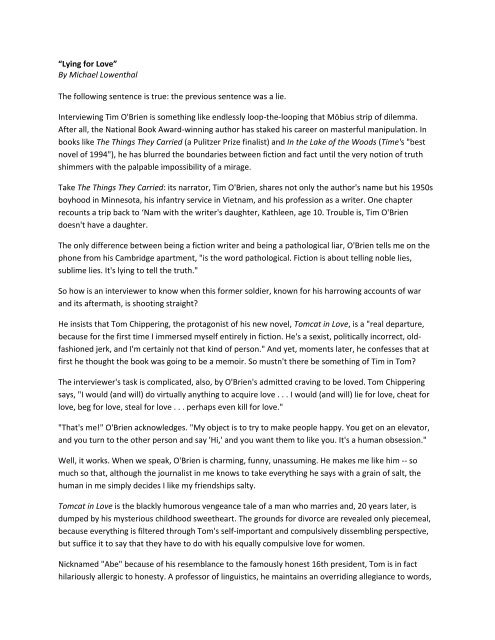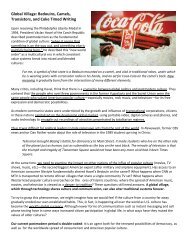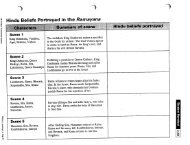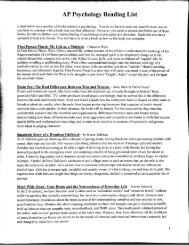“Lying for Love” By Michael Lowenthal The following ... - Staff.fcps.net
“Lying for Love” By Michael Lowenthal The following ... - Staff.fcps.net
“Lying for Love” By Michael Lowenthal The following ... - Staff.fcps.net
You also want an ePaper? Increase the reach of your titles
YUMPU automatically turns print PDFs into web optimized ePapers that Google loves.
<strong>“Lying</strong> <strong>for</strong> <strong>Love”</strong><br />
<strong>By</strong> <strong>Michael</strong> <strong>Lowenthal</strong><br />
<strong>The</strong> <strong>following</strong> sentence is true: the previous sentence was a lie.<br />
Interviewing Tim O'Brien is something like endlessly loop-the-looping that Möbius strip of dilemma.<br />
After all, the National Book Award-winning author has staked his career on masterful manipulation. In<br />
books like <strong>The</strong> Things <strong>The</strong>y Carried (a Pulitzer Prize finalist) and In the Lake of the Woods (Time's "best<br />
novel of 1994"), he has blurred the boundaries between fiction and fact until the very notion of truth<br />
shimmers with the palpable impossibility of a mirage.<br />
Take <strong>The</strong> Things <strong>The</strong>y Carried: its narrator, Tim O'Brien, shares not only the author's name but his 1950s<br />
boyhood in Minnesota, his infantry service in Vietnam, and his profession as a writer. One chapter<br />
recounts a trip back to ‘Nam with the writer's daughter, Kathleen, age 10. Trouble is, Tim O'Brien<br />
doesn't have a daughter.<br />
<strong>The</strong> only difference between being a fiction writer and being a pathological liar, O'Brien tells me on the<br />
phone from his Cambridge apartment, "is the word pathological. Fiction is about telling noble lies,<br />
sublime lies. It's lying to tell the truth."<br />
So how is an interviewer to know when this <strong>for</strong>mer soldier, known <strong>for</strong> his harrowing accounts of war<br />
and its aftermath, is shooting straight?<br />
He insists that Tom Chippering, the protagonist of his new novel, Tomcat in Love, is a "real departure,<br />
because <strong>for</strong> the first time I immersed myself entirely in fiction. He's a sexist, politically incorrect, oldfashioned<br />
jerk, and I'm certainly not that kind of person." And yet, moments later, he confesses that at<br />
first he thought the book was going to be a memoir. So mustn't there be something of Tim in Tom?<br />
<strong>The</strong> interviewer's task is complicated, also, by O'Brien's admitted craving to be loved. Tom Chippering<br />
says, "I would (and will) do virtually anything to acquire love . . . I would (and will) lie <strong>for</strong> love, cheat <strong>for</strong><br />
love, beg <strong>for</strong> love, steal <strong>for</strong> love . . . perhaps even kill <strong>for</strong> love."<br />
"That's me!" O'Brien acknowledges. "My object is to try to make people happy. You get on an elevator,<br />
and you turn to the other person and say 'Hi,' and you want them to like you. It's a human obsession."<br />
Well, it works. When we speak, O'Brien is charming, funny, unassuming. He makes me like him -- so<br />
much so that, although the journalist in me knows to take everything he says with a grain of salt, the<br />
human in me simply decides I like my friendships salty.<br />
Tomcat in Love is the blackly humorous vengeance tale of a man who marries and, 20 years later, is<br />
dumped by his mysterious childhood sweetheart. <strong>The</strong> grounds <strong>for</strong> divorce are revealed only piecemeal,<br />
because everything is filtered through Tom's self-important and compulsively dissembling perspective,<br />
but suffice it to say that they have to do with his equally compulsive love <strong>for</strong> women.<br />
Nicknamed "Abe" because of his resemblance to the famously honest 16th president, Tom is in fact<br />
hilariously allergic to honesty. A professor of linguistics, he maintains an overriding allegiance to words,
which he wields with Jesuitical finesse. (In this, Tom's resemblance to a different president -- the current<br />
one -- lends the book an uncanny and timely verisimilitude.)<br />
Tom's squirmy word-evasions and unreliable narration are the comic currents on which the novel sails.<br />
Tomcat is thus indeed a departure <strong>for</strong> O'Brien, but not so much in the way the publisher is spinning it --<br />
"Vietnam writer takes on the war between the sexes" -- as in terms of style. O'Brien's previous books are<br />
marked by prose of a hypnotic spareness; he seemed to disallow himself the use of any word that would<br />
not be uttered in a moment of crisis. But this novel rollicks along in Tom's lavishly verbose, digressive<br />
voice, reminiscent of Nabokov's Humbert Humbert in Lolita.<br />
"<strong>The</strong>re was such a joy in writing this book," O'Brien says. In conversation, he quotes punch line after<br />
punch line of his own prose, but it doesn't seem self-indulgent or egotistical. It's as though Tom<br />
Chippering were a guy O'Brien met in a bar and can't wait to tell you about.<br />
O'Brien hasn't left behind his old fixations entirely; Vietnam still factors in. But the war references here<br />
playfully undermine O'Brien's earlier work. Tom, <strong>for</strong> example, refers to himself as a decorated "war<br />
hero." It turns out, though, that he was a mere office clerk in Vietnam, whose task was to compose the<br />
citations accompanying medals. His own Silver Star was dubiously self-awarded.<br />
"I wanted to mock myself a little bit," explains O'Brien. "I've been so pegged as a Vietnam writer, it's<br />
gotten into some people's heads that Vietnam is still a late-night obsession. This is a way of laughing at<br />
that, of saying, `Hey, the war was over 25 years ago.' "Does he think this will offend the readers who<br />
were so affected by his previous books? "No, only the ones who liked the books <strong>for</strong> the wrong reasons."<br />
<strong>The</strong> other group O'Brien risks alienating with Tomcat is feminists (to whom Tom refers as "ill-mannered,<br />
cement-headed, shrill-voiced, holier-than-thou guardians of ovarian rectitude"). But O'Brien asserts that<br />
this is a "totally feminist book. . . . I'm relentlessly mocking this guy and all of us like him. It would take a<br />
pretty stupid feminist not to see that this is a feminist book."<br />
O'Brien's "all of us like him" might be telling; he himself has been dogged by rumors of womanizing. But<br />
I refrain from pressing him about this, or about anything too personal, because he is so darn likable --<br />
and because I want him to like me back.<br />
"Listen," he says, plainly relieved by my restraint, "if a book is going to endure, it has to be able to<br />
regardless of the author's history. Talking about all that personal stuff devalues the book."<br />
Which is why he's so peeved about a New York Times profile that appeared two days be<strong>for</strong>e our<br />
conversation. <strong>The</strong> article, by Bruce Weber, recounts O'Brien's bout with depression four years ago, after<br />
the collapse of his marriage -- and of the affair that doomed it. O'Brien vowed he would not write fiction<br />
again; he flirted with suicide. Weber focused on that pain as the new book's source.<br />
"I was so mad," O'Brien says. "I spent three days with [Weber], gambling, golfing, howling, and laughing.<br />
But when the piece came out, he made it seem like I was just a grim, macabre, back-looking guy hanging<br />
from a thread. We had one really bad talk, and he took everything from that."
One wonders what was said in that "one really bad talk," but it's also easy to see why O'Brien is upset.<br />
Here he has broken through his block and plowed new artistic ground, and all anyone wants to talk<br />
about is his dark times. "[Weber] kept asking me all these questions about pain, about Nam. I wanted to<br />
talk about how good I feel. I don't have horrible war dreams. I'm happy."<br />
O'Brien speaks gleefully of the "dream state" in which he found access to Tom's voice, the "unplanned<br />
joy" of spinning sentences. This is clearly not O'Brien the traumatized vet talking, or O'Brien the jilted (or<br />
jilting) lover; it's O'Brien the rejuvenated writer.<br />
"Stories can save us," goes a line from <strong>The</strong> Things <strong>The</strong>y Carried, and O'Brien admits that "in a very<br />
particular way, [writing Tomcat in Love] saved me. <strong>By</strong> creating this guy -- such a ridiculous version of the<br />
guy I was four years ago -- I was able to laugh at myself, and laugh at the hurt."<br />
O'Brien was saved. You can read it in Tomcat's hopeful humor, and you can hear it in the author's<br />
buoyant voice.<br />
Unless, of course, he's putting it on.<br />
<strong>Lowenthal</strong>, <strong>Michael</strong>. <strong>“Lying</strong> <strong>for</strong> love.” <strong>The</strong> Boston Phoenix. 1998. March 11, 2010.<br />
http://thephoenix.com/archive/books/98/10/15/TIM_O_BRIEN.html.







